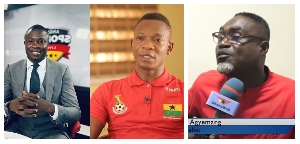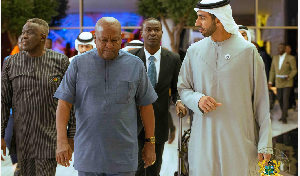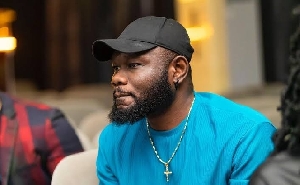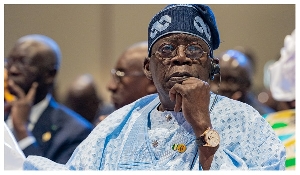By Francis Kwarteng
“The idea of value judgment, emotions, and subjectivity all come into play in assessing the statistical probability of human psychology and patterns of voting behavior.
“Namely, pollsters cannot always capture the fullest spectrum or continuum of subtleties and nuances in human psychology. The plasticity of the human brain, the epigenetic influences on its development and the brain’s interaction with the environment make for the complexity of the human brain. In this context, the human mind is such a great complex mystery to behold.
“What this also means is that the efforts of pollster Ephson may, at worst, be elitist exercises in intellectual exuberance. Pollster Ephson may not be an independent statistical assessor after all” (Francis Kwarteng, “Shut Your Trap Mac Manu, The Likes of You Don’t Own Ghana!” November 3, 2016).
Food for thought
“The only thing that is constant is change” (Heraclitus).
“We don’t need any more promises. We need to start keeping the promises we already made” (Kofi Annan).
The political illiteracy of the so-called discerning Ghanaian elector shines through his infatuation with political criminals he places at the helm of political and economic affairs—whether it is the NPP or the NDC.
It is excruciatingly sad that this discerning Ghanaian elector has never produced a single progressive, visionary and successful political leader anywhere in the brief political history of the Fourth Republic.
Both Akufo-Addo and President Mahama are both cut from this same stale, morally filthy cloth of political scoundrels.
There are no political saints in Ghana particularly in the Fourth Republic, our reference point.
To be more specific, though we cannot predict with any degree of mathematical certitude that a third political force will not be free from the bug of corruption, at least we do have more than ample evidence to indict the NPP and the NDC and certified them as the most corrupt political institutions in Ghana’s political history. This fact is not open to question!
The preceding observations notwithstanding, the discerning Ghanaian elector is so addicted to these political scoundrels that, as soon he begins to nurse or entertain the idea of ignoring them at the polls, he also begins to envision his crooked world come crashing down. This gripping dependency complex is the unsophisticated elector’s undoing.
Even more so, Ghana’s kleptomaniacal democracy has turned the average elector into the proverbial dung beetle, always carrying Sisyphean balls of feces but still lacking in the strategic prudence and visionary prowess of the dung beetle. As a people, can’t we ever learn from experience at all?
History as a powerful moral compass has been banished to the backburner to rust. The Ghanaian therefore needs to free himself from this imprisoned history of lackadaisical tendentiousness toward the institutionalization of social justice, patriotism, and the politics of transformation.
In this sense we shall say Ghanaians have learnt to put spoilt food into their mouths to produce feces, only to put the feces back into their mouths to produce yet another loaded treadmill of feces—that is, no change in political leadership.
The typical Ghanaian has become a coprophagous political animal, and this is not funny. No such coprophagous political animal can bring about true change in the status quo, for his addiction to the stinking carcass of his duopolistic kleptomaniacal democracy will simply not allow it.
Change is never and can never be realized when the same enemies of a people’s destiny are cyclically put in charge of national affairs under the chameleonic banner of sloganeering populism and unfulfillable grandiose campaign promises. Neither is true change erected on sympathy votes.
Change does not come about merely by repackaging or recycling the same corrupt political leadership. It comes about in part as a product of the polygamous marriage of a patriotic critical mass, righteous anger, political pressure, conscientization and responsible, pragmatic leadership. Even a vestige of public corruption in a recycled leadership can still derail a people’s victorious consciousness.
This is exactly what Nigerians under Muhammadu Buhari, Ivorians under Alassane Outtara, and also Americans under Donald Trump to name but three, are just beginning to realize.
The Ivorian’s is a case study in neocolonial stupidity as the French literally own and control 99% of the Ivorian economy.
Buhari is politically and ideologically stagnant, bereft of ideas and clueless as to what to do to salvage the Nigerian economy and to create employment opportunities for the Nigerian masses.
On the other hand Trump has scaled down his populist rhetoric by claiming among other things, that he may not be able to keep all his campaign promises.
He has now realized that for every thousand jobs he manages to keep here in America through his influence, the same number will be shipped overseas—possibly an instance of a zero-sum game.
This is America, not Ghana, the world’s largest economy and the most influential country in modern history.
Akufo-Addo should begin telling us which of his campaign promises are unfulfillable lies sold to the unsophisticated Ghanaian elector merely for political expediency, which ones are technocratically implemental or feasible and which are not, before he begins to make a fool of himself after he has officially assumed office. Buhari and Outtara failed to do this.
It is like saying the best or most effective way to assess Obama is not through the fractured lens of his presidency, but rather through this lens trained on the rational pragmatism of his Nobel Acceptance Speech.
Akufo-Addo should be more forthcoming than his colleagues in Ivory Coast and Nigeria have done thus far, by telling the public what his government is potentially capable of—and also incapable of.
This is because the Ghanaian expectation of the potential of his government to redeem the ailing national economy is almost limitless.
With that said, Kofi Annan’s statement to the effect that Akufo-Addo has the skills to improve the ailing Ghanaian economy is neither here nor there, as his statement is short on technocrat details as well as on a deep understanding of the shifting—or unpredictable—dynamics of the global economy.
These “skills” did not help the Kufuor government in any significant way. Neither those of Bawumia’s.
In fact these men will need great political and economic insights—short of the kind of fake miracles Bishop Obinim and Owusu Bempah perform before their ignorant following—to redeem this ailing economy.
After all we also these ruling elites, whether they come from the NDC or the NPP, do not care about the nation’s development or the standard of life and quality of life of the masses.
The average Ghanaian will just be lucky to find himself feeding on dispensable crumbs from the elitist table of kleptomaniacal democracy.
Again, the Ghanaian strain of kleptomaniacal democracy is best suited to the elitist taste of the ruling class.
This is why members of some whole communities refused to vote in these general elections given that they have never benefitted from either the NDC or the NPP.
Prior to the general elections for instance, leaders from these communities invoked curses on any members of these communities who dared flout their decrees and voted for either party. This is merely a tip of the iceberg. There are communities like these crisscrossing the country which have not benefitted from either party.
Those who are expecting “milk and honey” from Akufo-Addo should rather think of coming to terms with their nagging lactose intolerance and fructose malabsorption. It is probably never going to happen.
Here goes Tupac’s “Changes”:
“I see no changes…
“Wake up in the morning and I ask myself,
“Is life worth living? Should I blast myself?"
“I'm tired of being poor and even worse I'm black….
We are not being cautiously pessimistic. We are rather being optimistically objective and factual with the truth about schadenfreude politics in the Fourth Republic.
What the Buddhist’s refers to as “mudita”—otherwise vicarious or sympathetic joy—and Mandela/Tutu called “ubuntu” are totally absent in Ghanaian politics.
Granted, the Akufo-Addo presidency will most probably not usher in any substantial or quantum of improvement in the living conditions of the average Ghanaian.
Mark our words!
Sometimes—if not all the time—it is extremely difficult to give a politician(s) the benefit of the doubt. The burden of responsibility for Akufo-Addo to do right by the nation and by the masses now squarely rests with him. He should prove us wrong if our stubborn insistence of doubting or questioning his capacity for moral agency as a presidential material is worthy of celebration.
Unfortunately, democracy sometimes has a way of shielding the wrongdoing, political illiteracy and ignorance of a majority, a way of standing the truth on its head, a way of subverting the truth to suit the biases of a blind majority.
A majority of Ghanaians has nonetheless spoken in unadulterated abstraction in his behalf and therefore it is his turn to translate that abstraction of popular frustration not in reified grandiose terms of victorious consciousness, but rather in a practical language of quantitative (and qualitative) concreteness captured in the positive metrics of development economics and development sociology.
Until then, we remain the stubborn skeptics we always have been regarding his capacity for moral agency and managerial prudence.
THE IMPLIED REPERCUSSIONS OF KOFI ANNAN’S CHECKERED LEGACY FOR AKUFO-ADDO’S
One critic of Annan (and the United Nations) describes his legacy this way (Nile Gardiner):
“The Iraq war undermined Annan's own position as a world leader and exposed the U.N.'s growing impotence in the post-9/11 era. It also exposed the huge degree of corruption and mismanagement involving the U.N.'s Oil-for-Food Program, an epic scandal that continues to unfold.
“Annan's departure from office has not come soon enough. His 10 years in power have been a monumental failure, and he leaves behind an institution whose standing could barely be lower and a legacy that is a testament to mismanagement, corruption, and anti-Americanism.
“Over the past 12 years, the U.N. has been dominated by scandal, division, and failure. From the disaster of the U.N. peacekeeping missions in Rwanda and Bosnia in the mid-1990s to the U.N.'s slow response to the Sudan genocide, its recent track record has been spectacularly unimpressive…
“The Oil-for-Food and Congo peacekeeping scandals have had a devastating impact on the U.N.'s reputation and have reinforced the view that the world body is riddled with corruption and mismanagement, as well as undisciplined in its peacekeeping operations. The failure of the U.N. Commission on Human Rights-now the U.N. Human Rights Council-which was populated with some of the world's worst human rights violators…
“Under Annan the U.N. has shamelessly appeased dictators and tyrants, from Baghdad to Tehran to Khartoum, and has stood weak-kneed in the face of genocide and ethnic cleansing. As head of United Nations peacekeeping operations in the mid-1990s before he rose to Secretary General, Annan never apologized to the victims of the Rwanda genocide, whose slaughter was the consequence of the U.N.'s failure to intervene, or to the families of Muslims massacred at Srebrenica while under the protection of U.N. soldiers.
“Annan's lack of humility in the face of great human tragedy has been one of his greatest shortcomings as a U.N. leader…Annan has talked about accountability and transparency and the supposed winds of change sweeping through the U.N., but his own leadership has belied his words…”
In sum, as Secretary General of the United Nations Annan reportedly never took to Joe Klein’s book “Global Deception: The UN's Stealth Assault on America's Freedom,” a critical indictment of his stewardship of the UN. Akufo-Addo (and his incoming government and advisors) should not take the burden of statecraft lightly.
Thus, he may want to ignore Annan’s feel-good rhetorical ornateness and stick to the facts of political realism which, among other things, should entail his investment in rational introspection as well as his genuine assessment and on the whole, his acknowledgement of the potential weaknesses and strengths of his incoming government.
Ideally, he may then have to share this with the public once he officially assumes office.
We shall return with Part 4.
References
Nile Gardiner. “Kofi Annan’s Legacy of Failure.” Retrieved from http://www.heritage.org/research/reports/2006/12/kofi-annans-legacy-of-failure
Opinions of Friday, 16 December 2016
Columnist: Kwarteng, Francis















